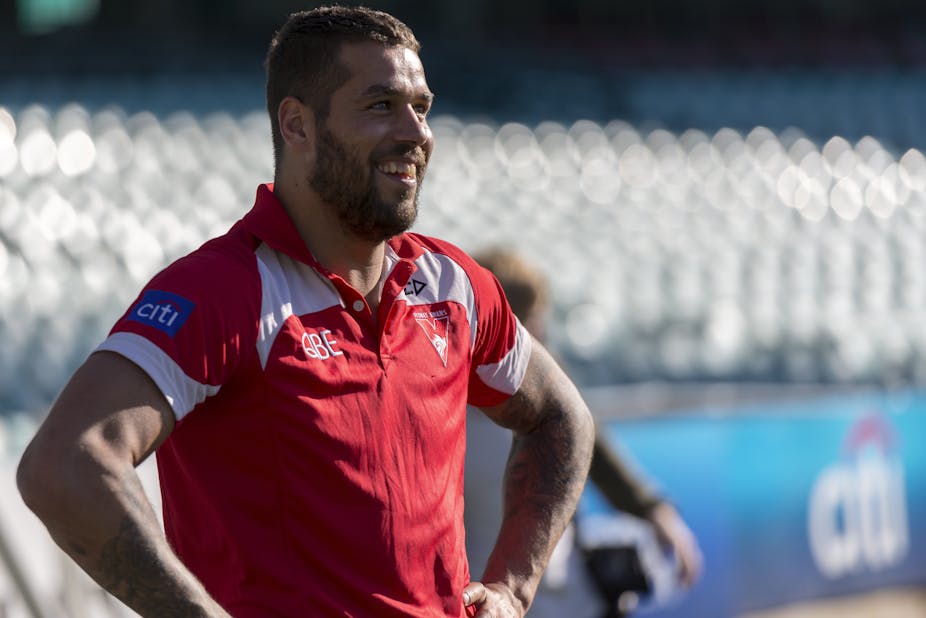It’s early in the fourth quarter and Lance “Buddy” Franklin is enjoying himself. Celebrating his 200th game against St Kilda at the Sydney Cricket Ground (SCG) last month, the Sydney Swans forward has already booted eight goals and clearly wants more. He’s been swaggering since his first goal, four minutes into the match.
It’s one of those days where, even as a Swans fan, you feel sorry for his defenders. Hapless, face in hands, they try to keep it all together. But the ball keeps coming in and Buddy keeps doing his thing.
His ninth goal is the best of the lot. Like Mick Jagger leaving Satisfaction until the encore, Franklin skips around one opponent, holds another off with his right hand and slams the ball through with his left foot. Around me, grown men and women shake their heads in happy disbelief.
On Saturday afternoon, Franklin will line up against his old side, Hawthorn, in the AFL grand final. In football’s biggest week, he’s football’s biggest story.
Since joining the Swans in late 2013, Buddy has rarely left the spotlight. Before the season began, media reports claimed he was corrupting Sydney’s internal culture. Tabloids suggested he was enjoying the Bondi lifestyle a little too much. In April, he crashed his girlfriend’s Jeep into five parked cars.

But by the end of the season, his talent was well and truly the main story. Crowds flocked to the SCG to see him play. He finished the season with the Coleman Medal, the award given to the AFL’s highest goal kicker. The word “hero” was thrown around liberally.
But does Buddy Franklin really make sense as an Australian hero? Brash, confident, so aware that he’s brilliant, how does he fit within the line of national idols?
Peter Carey, the prize-winning Australian novelist, once said that our tales of heroism were all about loss. Ned Kelly, a bushranger who was hanged by the police; Burke and Wills, explorers who got lost and died; Gallipoli, a military adventure doomed from its inception. Because the Australian landscape is so unforgiving, Carey argued that the national narrative is defined by stoicism in the face of great challenges.
Take the ABC’s recent series, ANZAC Girls. The show is about the Australian nurses who served at Gallipoli and the Western Front, placing women at the centre of the Anzac legend. The nurses are seen as heroic, but not because of technical brilliance. What’s really heroic is their competence in the face of brutal adversity.
The historian Graeme Davison made a similar point when he argued Australians have largely been “wary of hero worship”. In a country that wanted to believe that “Jack is as good as his master”, the existence of heroes was a threat to egalitarianism. The greatest insult of all was to be a “wanker” – aware of your own superiority.
But writing in the year 2000, Davidson thought this was slowly changing. The phrase “tall poppy syndrome” entered the national vocabulary. Australians were more enthusiastic about honouring high achievers, especially if they played sport. In his book The Use and Abuse of Australian History, he wrote:
Egalitarians were more likely to rejoice in the fall of the high achiever … but those who wished to cut down the tall poppies were outnumbered by those who wished them to grow taller.
Buddy Franklin walks this cultural tightrope. He’s not exactly a “wanker” – from all reports he’s a great and supportive team-mate. It’s just that he knows he’s good. You can see it in the way he struts after a goal, the way he drinks in the applause of his fans.
But if some Australians do love Buddy’s confident brilliance, some of the old egalitarian spirit remains. After his car crash and a poor start to the year, people were quick to bring him down. A small crack in the armour was enough. He was a waste of money whose arrogance was killing the Swans from the inside.
Compare this to the way Americans handled Lance Armstrong. Despite glaring personality flaws – egotism, bullying, lying – he continued to be the country’s spotless sporting idol. The country believed in the power of the heroic individual. While the house of cards did eventually collapse, it was only when the US could no longer honestly avert its eyes from the truth.
The Australian hero might be slowly moving towards the American ideal – valuing excellence above all, comfortable with superiority – but we’re not there yet. Arrogance is still quickly pulled down.
But as a Swans fan, I for one will let that slide on Saturday afternoon. If Buddy kicks another nine goals, he can strut as much as he wants.
He’ll still be a hero to me.

